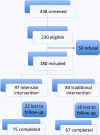Cardiometabolic risk reduction through lifestyle intervention programs in the Brazilian public health system
- PMID: 23597156
- PMCID: PMC3706232
- DOI: 10.1186/1758-5996-5-21
Cardiometabolic risk reduction through lifestyle intervention programs in the Brazilian public health system
Abstract
Public health strategies to reduce cardiovascular morbidity and mortality should focus on global cardiometabolic risk reduction. The efficacy of lifestyle changes to prevent type 2 diabetes have been demonstrated, but low-cost interventions to reduce cardiometabolic risk in Latin-America have been rarely reported. Our group developed 2 programs to promote health of high-risk individuals attending a primary care center in Brazil. This study compared the effects of two 9-month lifestyle interventions, one based on medical consultations (traditional) and another with 13 multi-professional group sessions in addition to the medical consultations (intensive) on cardiometabolic parameters. Adults were eligible if they had pre-diabetes (according to the American Diabetes Association) and/or metabolic syndrome (International Diabetes Federation criteria for Latin-America). Data were expressed as means and standard deviations or percentages and compared between groups or testing visits. A p-value < 0.05 was considered significant.
Results: 180 individuals agreed to participate (35.0% men, mean age 54.7 ± 12.3 years, 86.1% overweight or obese). 83 were allocated to the traditional and 97 to the intensive program. Both interventions reduced body mass index, waist circumference and tumor necrosis factor-α. Only intensive program reduced 2-hour plasma glucose and blood pressure and increased adiponectin values, but HDL-cholesterol increased only in the traditional. Also, responses to programs were better in intensive compared to traditional program in terms of blood pressure and adiponectin improvements. No new case of diabetes in intensive but 3 cases and one myocardial infarction in traditional program were detected. Both programs induced metabolic improvement in the short-term, but if better results in the intensive are due to higher awareness about risk and self-motivation deserves further investigation. In conclusion, these low-cost interventions are able to minimize cardiometabolic risk factors involved in the progression to type 2 diabetes and/or cardiovascular disease.
Keywords: Cardiometabolic risk; Lifestyle intervention; Metabolic syndrome; Pre-diabetes; Public health system.
Figures
References
-
- Morbidity and mortality: 2012 Chart Book on Cardiovascular, lung and Blood Deseases. http://www.nhlbi.nih.gov/resources/docs/2012_ChartBook.pdf.
-
- Ramachandran A, Snehalatha C, Mary S, Mukesh B, Bhaskar AD, Vijay V. Indian Diabetes Prevention Programme (IDPP) The Indian diabetes prevention programme shows that lifestyle modification and metformin prevent type 2 diabetes in Asian Indian subjects with impaired glucose tolerance (IDPP-1) Diabetologia. 2006;49:289–297. - PubMed
LinkOut - more resources
Full Text Sources
Other Literature Sources



